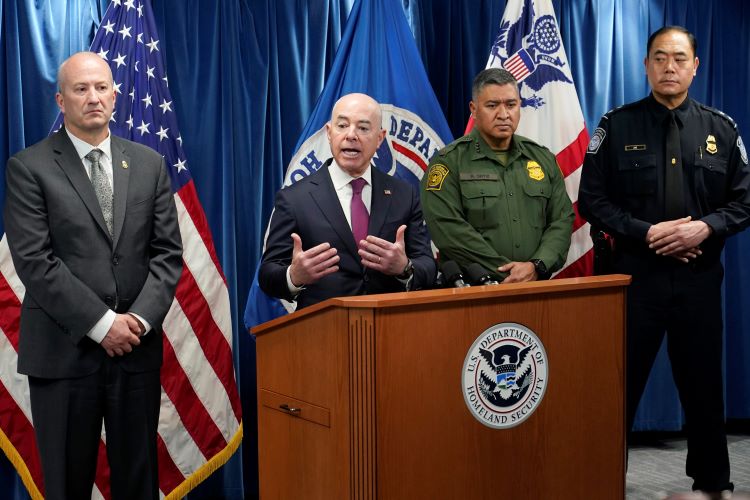Asylum-seekers entering US illegally would be subject to rebuttable presumption under Biden border proposal
 U.S. Department of Homeland Security Secretary Alejandro Mayorkas, second from left, speaks during a news conference Jan. 5 on new border enforcement measures to limit unlawful migration, expand pathways for legal immigration and increase border security. Photo by Susan Walsh/The Associated Press.
U.S. Department of Homeland Security Secretary Alejandro Mayorkas, second from left, speaks during a news conference Jan. 5 on new border enforcement measures to limit unlawful migration, expand pathways for legal immigration and increase border security. Photo by Susan Walsh/The Associated Press.
President Joe Biden announced a new border policy Thursday that will admit up to 30,000 migrants per month from Cuba, Haiti, Nicaragua and Venezuela.
At the same time, migrants from those countries who enter the country illegally with no legal basis to remain here will be banned from the program and subject to expulsion to Mexico, according to press releases here and here. And all migrants crossing the border illegally would be subject to a more difficult standard for claiming asylum under a proposed rule.
The migrants from Cuba, Haiti, Nicaragua and Venezuela seeking admission under the new parole program must have a sponsor and pass vetting and background checks. Those who satisfy the requirements can live in the United States for up to two years and receive work authorization.
The proposed asylum rule would apply to migrants who fail to use legal pathways to enter the United States and fail to seek protection in a country through which they traveled to the United Sates. The rule would create a rebuttable presumption that these immigrants are ineligible for asylum—with some exceptions. Those who can’t make a valid asylum claim would be “subject to prompt removal” and banned from reentry for five years.
The Biden administration said it is also tripling refugee resettlement to allow for up to 20,000 refugees from Latin American and Caribbean countries during fiscal years 2023 and 2024.
Currently, asylum-seekers are subject to expulsion under a policy adopted during the Trump administration and temporarily kept in place by the U.S. Supreme Court. That policy, based on Title 42 of the U.S. Code, part of the of the Public Health Service Act of 1944, cites the risk of the spread of COVID-19 to quickly expel asylum-seekers.
Those expelled under Title 42 are not barred from trying to come back to the United States, Biden said in remarks published here.
The administration is also increasing and enhancing expedited removal under Title 8 of the U.S. Code for those who can’t be processed under Title 42.
“Let me be clear,” said U.S. Department of Homeland Security Secretary Alejandro Mayorkas in published remarks. “Title 42 or not, the border is not open. … We will comply with the court orders that require us to continue enforcing the Title 42 order, and we will also use this time to enhance and increase our use of expedited removal under Title 8 where permitted to do so.”
The government has also created a CBP One app that will initially be used for those seeking admission under the new program. When Title 42 is no longer in place, noncitizens can use the app to schedule an appointment and initiate a protection claim.
“This new process is orderly, it’s safe, and it’s humane,” Biden said in published remarks. “And it works.”
The temporary admission program was initially created for Venezuelans. After that, the number of Venezuelans trying to enter the United States illegally decreased “from about 1,100 per day to less than 250 per day, on average,” Biden said.
Biden previously condemned former President Donald Trump’s asylum ban for people who didn’t apply for asylum in countries that they traveled through, according to a press release from the American Civil Liberties Union.
“But today, the White House announced that he plans to bring a version of that ban back,” said Jonathan Blazer, the ACLU’s director of border strategies, in the press release. “His commitments to people seeking safety will ring utterly hollow if he moves forward in substituting one illegal anti-asylum Trump policy for another.”
Blazer also criticized Biden for tying the benefits of the new program for migrants from Cuba, Haiti, Nicaragua and Venezuela to “dangerous expulsions” for those who can’t show a valid legal basis to remain here.
Publications with coverage of the new policy include the Washington Post, Law360, Courthouse News Service and the New York Times.
Write a letter to the editor, share a story tip or update, or report an error.


